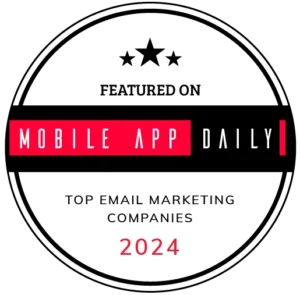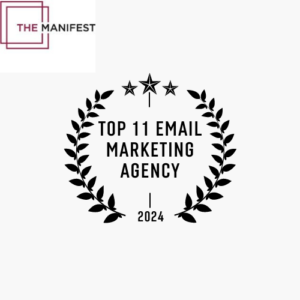The ever-evolving world of B2B lead generation may feel overwhelming. Strategies constantly shift, and technologies are sparking new possibilities.
This blog post is aimed to help you dive deep into the current changes and gain valuable insights into the emerging strategies and technologies shaping the future of effective lead generation in today’s dynamic business environment. Join us as we explore the top 5 trends and steer the course to successful B2B lead generation. Buckle up for a captivating ride!
1. Influencer Marketing in B2B Lead Generation
While influencer marketing is often associated with the B2C context, its principles can also be applied effectively in B2B lead generation. This strategy helps businesses connect with and persuade their target audience through the influential voices of people with a significant online presence – B2B influencers. These are often people with expertise, credibility, and a substantial following within a particular industry or niche. They may be industry analysts, consultants, executives, or professionals.

B2B influencers in lead generation campaigns may involve endorsing specific products or services, contributing to case studies, or participating in co-marketing initiatives. Their collaboration helps promote your products or services if you establish the right relationships with them. Building relationships involves engaging with influencers on social media, attending industry events, and reaching out through personalized communication. Building a genuine connection lays the foundation for potential collaborations.
Talking about the benefits and key roles of influencer marketing in B2B lead generation we can name the following ones:
Collaborating with influencers provides networking opportunities with other professionals in the industry. This can lead to valuable connections, partnerships, and potential leads.
Through their expertise, influencers can help in qualifying leads by attracting professionals who are genuinely interested in the industry or the solutions the brand provides.
The influencer’s expertise adds credibility to the content, such as webinars, whitepapers, or guest blog posts, attracting the attention of the target audience.
B2B influencers are often seen as thought leaders. Partnering with them allows businesses to amplify their own thought leadership initiatives and associate a brand with influencers in the industry.
B2B influencers have followers who are often part of the target audience. Leveraging an influencer’s reach helps businesses extend their message to a wider and more targeted audience, including potential leads and decision-makers.
B2B purchasing decisions are often based on trust and credibility. Influencers bring a level of trust to the table, and their endorsement can positively impact the perception of a brand, making it more likely for leads to engage with the business.
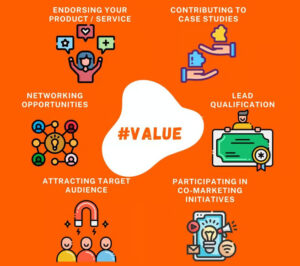
Metrics such as engagement, lead conversions, and the growth of the brand’s online presence are essential for measuring the impact of influencer marketing in B2B lead generation. This allows businesses to assess the effectiveness of their influencer collaborations.
2. De-fluffed messaging
B2B decision-makers are often pressed for time and prefer straightforward, clear communication. That is where so-called “De-fluffed messaging” brings the biggest value. The concept of de-fluffed messaging, or the idea of communicating in a clear and concise manner without unnecessary or overly elaborate language, has likely been present for a long time. However, the term “de-fluffed” itself may be a more recent colloquial expression arising in response to the need for streamlined and direct communication in our fast-paced digital age.
As information overload became a challenge in the era of online communication, individuals and businesses recognized the importance of delivering messages in a succinct and easily digestible way. The goal of de-fluffed messaging is to ensure that information is easily understood by the audience. This approach is important in marketing and particularly in b2b lead generation, where clear and straightforward communication can enhance the impact of the message and resonate better with the target audience. It often involves stripping away superfluous words, jargon, or confusing, complex language to convey a message more directly and effectively.
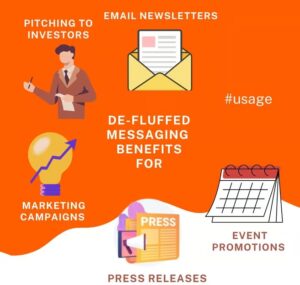
De-fluffed messaging is particularly beneficial for marketing campaigns, email newsletters, pitching to investors, press releases, or event promotions. Crafting de-fluffed messages is crucial for capturing the attention of busy professionals who often skim through their information and need a brief and captivating explanation of the value you may bring.
3. ABM – Account-Based Marketing
In the dynamic realm of marketing, ABM is the strategic maestro, directing its focus on specific, high-value accounts rather than scattering efforts across a broad audience. Your current aim is no longer the campaign that increases leads’ quantity — it’s all about running the campaign that brings you the most profitable leads. In this narrative, marketing and sales teams join tailored marketing efforts, forming a tight-knit alliance to create a cohesive strategy. It’s a collaborative journey, where precision meets personalization.
ABM strategies vary based on industry, goals, and target audience. Some examples of its tactics may include:
Creating customized content like emails, whitepapers, or account-specific landing pages
Engaging with and sharing content directly relevant to the target accounts on social media platforms. This can involve commenting on their posts, sharing their content, or initiating conversations
Utilizing LinkedIn’s advertising platform to target specific companies or job roles within those companies
Hosting exclusive events or webinars targeted at specific companies or industries to directly engage the key decision-makers and showcase a commitment to addressing their needs
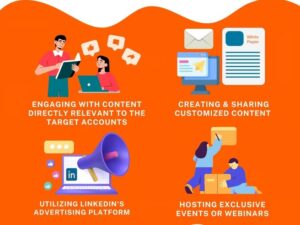
Its impact on lead generation is significant, prioritizing high-value accounts from the start and ensuring that marketing messages resonate with key decision-makers. Personalized marketing caters to the unique needs and preferences of each target account. Such a hyper-personalized approach fosters a deeper understanding of account requirements, building stronger relationships and increasing the likelihood of successful engagement. ABM’s precision targeting and customized content delivery enhance the overall effectiveness of marketing efforts, aligning strategies closely with the individual needs and priorities of each target account.
4. Deep engagement with customers
Though we’ve already covered a bit of the personalization aspect while we were talking about the ABM, it still can be looked at from another point. While ABM’s goal is to build relationships and drive engagement at the account level, personalization is a broader concept that involves leveraging advanced data analytics and technology to create highly individualized experiences for each customer. It may go a little beyond surface interactions and focuses on understanding each customer’s unique challenges and aspirations as well as building profound connections with them throughout their whole buying journey.
Deep engagement in B2B lead generation involves consistently providing valuable insights and addressing individual pain points. Here are some examples:
personalized customer support based on the customer’s industry, previous interactions, or specific challenges they face.
personalized product recommendations based on the customer’s purchase history or industry requirements.
customizing website content based on the visitor’s industry, location, or previous browsing behavior.
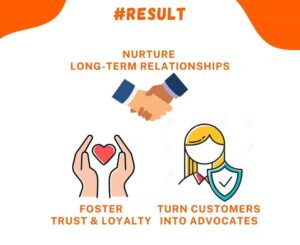
This approach extends beyond initial conversions, nurturing long-term relationships, fostering trust and loyalty, and turning customers into advocates. Through ongoing communication, tailored solutions, and a commitment to understanding client needs, personalization becomes a powerful catalyst for sustained success in the intricate landscape of B2B lead generation.
5. Artificial Intelligence (AI) in B2B marketing and lead generation
In 2024, the impact of AI on B2B marketing is about to expand. AI-driven tools revolutionize and reshape the landscape of B2B lead generation, bringing both advantages and challenges to the forefront. In the realm of B2B marketing, AI is a double-edged sword, offering unprecedented efficiency while raising concerns about autonomy and data privacy.
AI in B2B marketing is lauded for its ability to automate routine tasks, enhance data analysis, leverage predictive analytics, and deploy intelligent chatbots for real-time interactions and support beyond regular business hours. The potential benefits include streamlined processes, optimized campaign outcomes, and improved customer engagement.
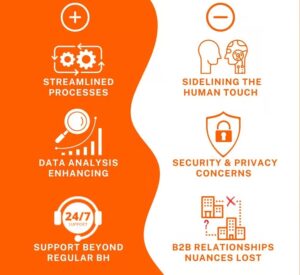
However, while AI presents a compelling case for revolutionizing B2B lead generation, it comes with notable drawbacks. One prominent concern is the overreliance on automated decision-making, potentially sidelining the human touch. The intricacies of nuanced B2B relationships may be lost in the algorithmic pursuit of efficiency. Furthermore, the consolidation and analysis of vast datasets raise legitimate concerns about data security and privacy breaches.
Despite the promising capabilities of AI, some practitioners in B2B marketing may choose to abstain from integrating AI into their workflows. The decision may stem from a desire to maintain a more hands-on, personalized approach or concerns about the ethical implications of AI-driven decision-making in sensitive business contexts. Balancing the allure of AI’s potential with a critical assessment of its drawbacks remains pivotal for conscientious B2B marketers.
Recommended articles related to B2B Lead Generation Trends:
Unlocking Success: Important Answers About B2B Lead Generation
The ABCs of Effective B2B Lead Scoring: A Practical Guide
Future of B2B Lead Generation
So you may be wondering “What’s next?” Can someone peek behind the curtain and tell us about what the B2B marketing industry prepared for us? Once anyone invents a time machine they will probably tell us about it, but now we can just assume what the future of B2B lead generation will be. It promises continued evolution driven by technological advancements, changing consumer behaviors, interactive content, and a shifting business landscape.
You have to keep an eye on the new trends appearing regularly to succeed in B2B lead generation and you may start by following the trends noticed in this post which are likely to shape the B2B marketing landscape in the upcoming 2024 year. As we navigate the ever-changing currents of technology and consumer behavior, embracing these trends empowers businesses to forge stronger connections with their audiences, drive meaningful engagement, and stay ahead of the competition.
Remember, the landscape of B2B lead generation is a canvas of innovation, and those who adeptly wield the brushes of these trends will paint a picture of success. Continual learning, flexibility, and a willingness to experiment are the cornerstones of a robust B2B marketing strategy.
Subscribe to our newsletter for more valuable content.


